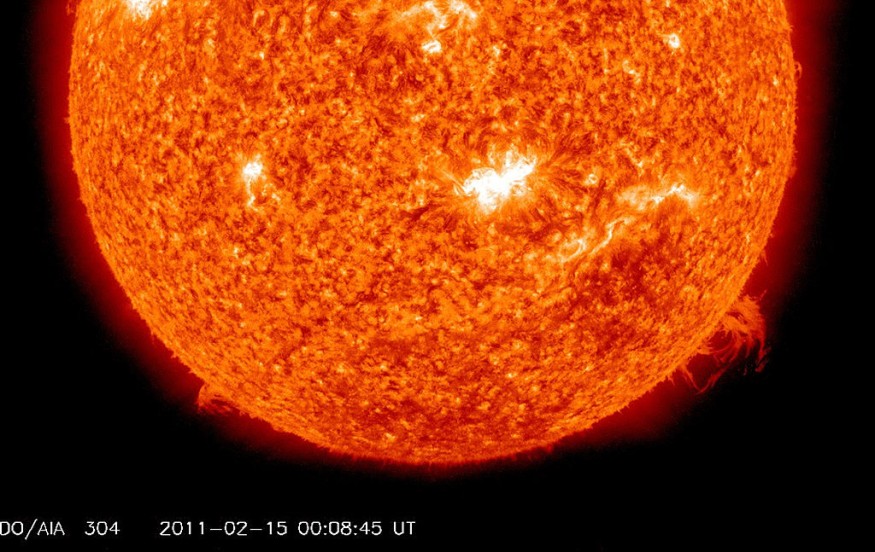Several experts predicted a solar flare would strike Earth within several days. The geomagnetic storm could cause mayhem on the railways, magnetic storms, and damage to the electricity infrastructure.
The chance of a solar storm came after a recent explosion on the sun's surface, which resulted in a "canyon of fire" bursting over the surface, The Sun reported.
Experts anticipated a torrent of solar flares directed at Earth due to the explosion that took place on Friday.

The researchers at SpaceWeather.com believe that the solar flare might enter the magnetosphere of Earth on or around July 20.
A solar flare that hits Earth might cause brief but bothersome geomagnetic storms.
On July 16, Space Weather noted the eruption of a black magnetic filament from the sun.
NASA's Solar Dynamics Observatory captured the solar outburst.
According to Space Weather, the canyon visible in the light was 155,000 miles long and 15,500 miles deep.
Solar Flare's Direct Hit on July 19
The "Space Weather Woman," Dr. Tamitha Skov, predicted that a solar storm would "direct impact" Earth on Tuesday. She used social media to distribute information and a NASA prediction model video.
According to Interesting Engineering, Skov is a research scientist at the nationally supported Aerospace Corporation and a recognized expert in the field of online science education.
Direct Hit! A snake-like filament launched as a big #solarstorm while in the Earth-strike zone. NASA predicts impact early July 19. Strong #aurora shows possible with this one, deep into mid-latitudes. Amateur #radio & #GPS users expect signal disruptions on Earth's nightside. pic.twitter.com/7FHgS63xiU
— Dr. Tamitha Skov (@TamithaSkov) July 16, 2022
"A snake-like filament launched as a big #solarstorm while in the Earth-strike zone," Skov wrote on Twitter.
Skov, citing NASA's predictions, mentioned that a solar storm would have a "direct hit" on July 19.
She added another alarming tweet that included a Sun video.
The long snake-like filament cartwheeled its way off the #Sun in a stunning ballet. The magnetic orientation of this Earth-directed #solarstorm is going to tough to predict. G2-level (possibly G3) conditions may occur if the magnetic field of this storm is oriented southward! pic.twitter.com/SNAZGMmqzi
— Dr. Tamitha Skov (@TamithaSkov) July 16, 2022
She also claimed that the long filament that resembled a snake cartwheeled its way off the sun in a beautiful ballet.
Skov believed it would be challenging to forecast the magnetic orientation of this Earth-directed solar storm. However, if the magnetic field of this storm is pointed southward, G2-level (perhaps G3) conditions might develop.
Geomagnetic Storm May Interfere With Railway Operations
According to physicist Cameron Patterson of Lancaster University, such space weather phenomena can cause electrical currents that interfere with the regular operation of signaling systems, turning green lights red when there are no nearby trains.
"Most of us have at one point heard the dreaded words: 'your train is delayed due to a signaling failure,"' Patterson mentioned per Express.com.
Many individuals, according to Patterson, have not thought about the possibility that the sun may interfere with train signals.
Researchers cautioned that solar storms might cause terrible accidents by interfering with electrical impulses and turning red lights into green.
Mr. Patterson acknowledged that this was an unlikely conclusion. According to Patterson, specialists are currently examining how violent a storm has to be to convert a red light back to green in the scenario when trains are on the line.
He continued, saying that this is a riskier scenario that may result in collisions.
Trains are situated in railway systems by segmenting the lines into short, consecutive sections known as "blocks," which typically have a length of 0.6 to 1.2 miles.
Each block is connected to a signal indicating where a train is currently on that block. Relays that detect electrical currents in the system change the light green to indicate that there are no trains on the block.
In contrast, if the relays do not detect a current, the system assumes that a train is in the block and turns the lights red.
Solar storms can cause portions of track to be given a red light even when not in use by causing currents in the railway network.
Additionally, more signals are expected to malfunction the stronger the solar storm, which would result in additional delays for train passengers.
RELATED ARTICLE : Solar Storm Warning: Flares Are Heading Towards the Earth, Could It Take Down Communications Lines Worldwide?
Check out more news and information on Space in Science Times.










